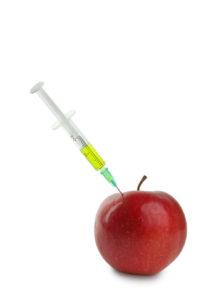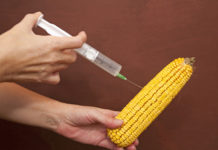Currently 38 countries have banned genetically modified crops (GMOs). Produce such as corn, Hawaiian papaya, zucchini, yellow summer squash and edamame are likely to be GMO unless labeled ” organic.”(2)Many countries have established regulations to protect their people and their environment from the damage caused by these crops.(3) Recently, the American Academy of Environmental Medicine has urged doctors to prescribe a non-GMO diet for all patients, citing studies that show organ damage, gastrointestinal and immune disorders, accelerated aging and infertility connected to GMO foods. Additional studies found the insecticide produced by GM corn found in the blood of pregnant women and their unborn baby.(4) 
Nine years following the introduction of GMOs, Americans with three or more chronic illnesses have increased from 7% to 13%.
Disorders such as autism, reproductive disorders, digestive problems and even food allergies have all increased.(4) Environmentally, GM crops can harm birds, insects, amphibians, marine ecosystems and soil organisms. They have also been found to reduce bio-diversity, pollute water resources, and are not part of a sustainable system. Since the introduction of GM crops, the monarch butterfly population is down 50 percent in the U.S, GM canola has been found growing wild in North Dakota and California, passing on its herbicide tolerant gene to weeds.(4) The production of GMO foods has a negative effect on world hunger. Sustainable non-GMO agricultural methods have resulted in 79 percent higher yield increases. GMO agriculture has not been found to increase yields at all, according to the Union of Concerned Scientists 2009 report.(4)
The International Assessment of Agriculture Knowledge, Science and Technology for Development report, which was authored by more than 400 scientists and backed by 58 governments, reported that GMO crop yields were “highly variable” and in some cases their “yields declined.” This report also determined that current GMO’s have no positive impact on the goals of reducing hunger and poverty and do not improve nutrition, health and rural livelihood. The production and growth of GMO foods have not been found to facilitate social and environmental sustainability.(4) Whether you are planting your own garden or shopping at your local market it is important to understand the difference between hybrid crops, GMO’s and heirloom plants.
- Hybrid: Plants that are cross-pollinated to create offspring to get desired characteristics from each parent plant. This is a process that also can occur naturally.
- GMOs: Plants that are modified through unnatural methods such as gene splicing, in order to ensure the plant contains the desired traits.
- Heirloom: Plants that come from open-pollinated plants that pass on their characteristics to their offspring. Heirloom plants can be organic or non-organic.
(5)
Five tips to avoid genetically modified crops (GMOs)
If you have made a decision to avoid genetically modified crops (GMOs), consider buying locally grown organic foods or growing your own, and avoid processed foods. Follow these five tips to avoid GMO foods:
- Assume all non-organic corn, soy, cottonseed and canola ingredients are GMO.
- Avoid all artificial sweeteners.
- Avoid ingredients that are derived from GMOs such as: whey, xanthan gum, glutamate, hydrolyzed vegetable protein, lactic acid, cellulose, citric acid, maltodextrin, and mono and diglycerides.
- If you consume dairy, purchase only products certified by an organic dairy.
- Don’t trust the PLU code stickers on produce to differentiate GMO from non-GMO — play it safe and only buy products clearly labeled organic.
(6)
By Matthew Monarch, May, 2016
Proprietor, theRawFoodWorld.com
Sources:
- http://www.who.int/foodsafety/areas_work/food-technology/faq-genetically-modified-food/en/
- http://www.wholefoodsmarket.com/how-shop-if-youre-avoiding-gmos
- http://sustainablepulse.com/2015/10/22/gm-crops-now-banned-in-36-countries-worldwide-sustainable-pulse-research/
- http://responsibletechnology.org/10-reasons-to-avoid-gmos/
- http://www.organiclesson.com/heirloom-seeds-vs-hybrid-vs-gmo-infographic/
- http://naturalsociety.com/5-tips-how-to-avoid-gmo-foods-grocery-store/
Also Read:

















